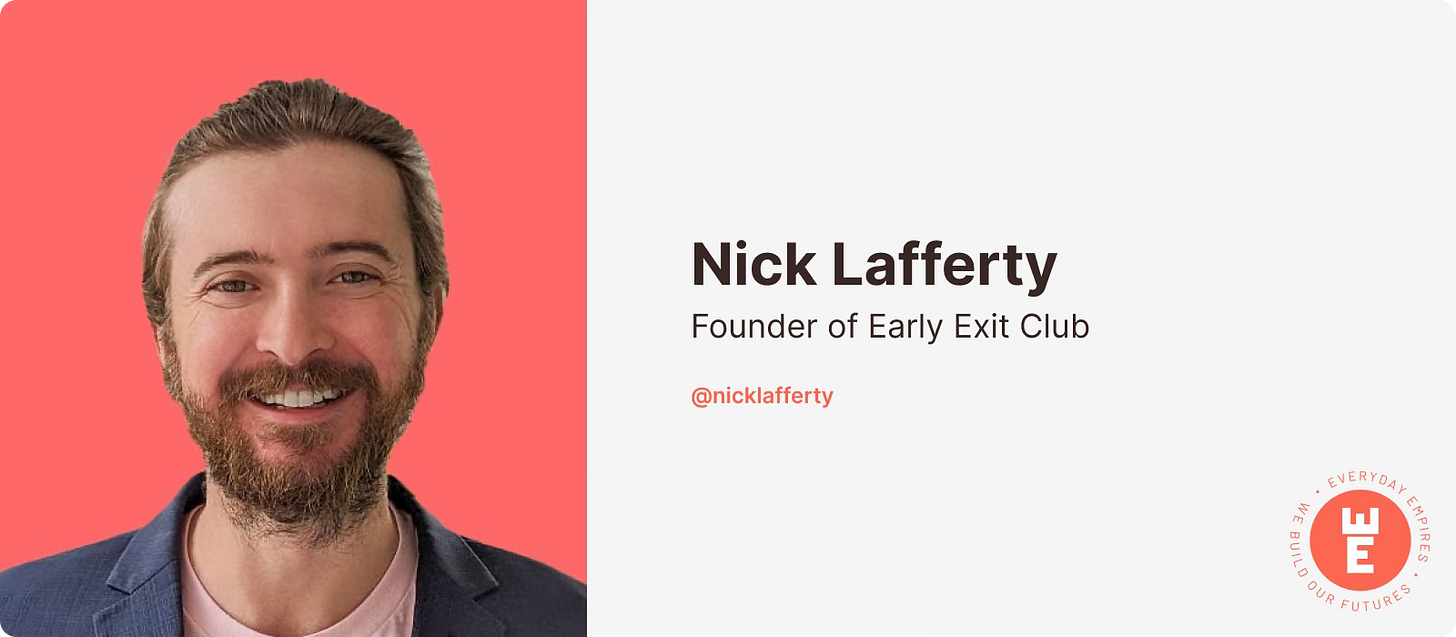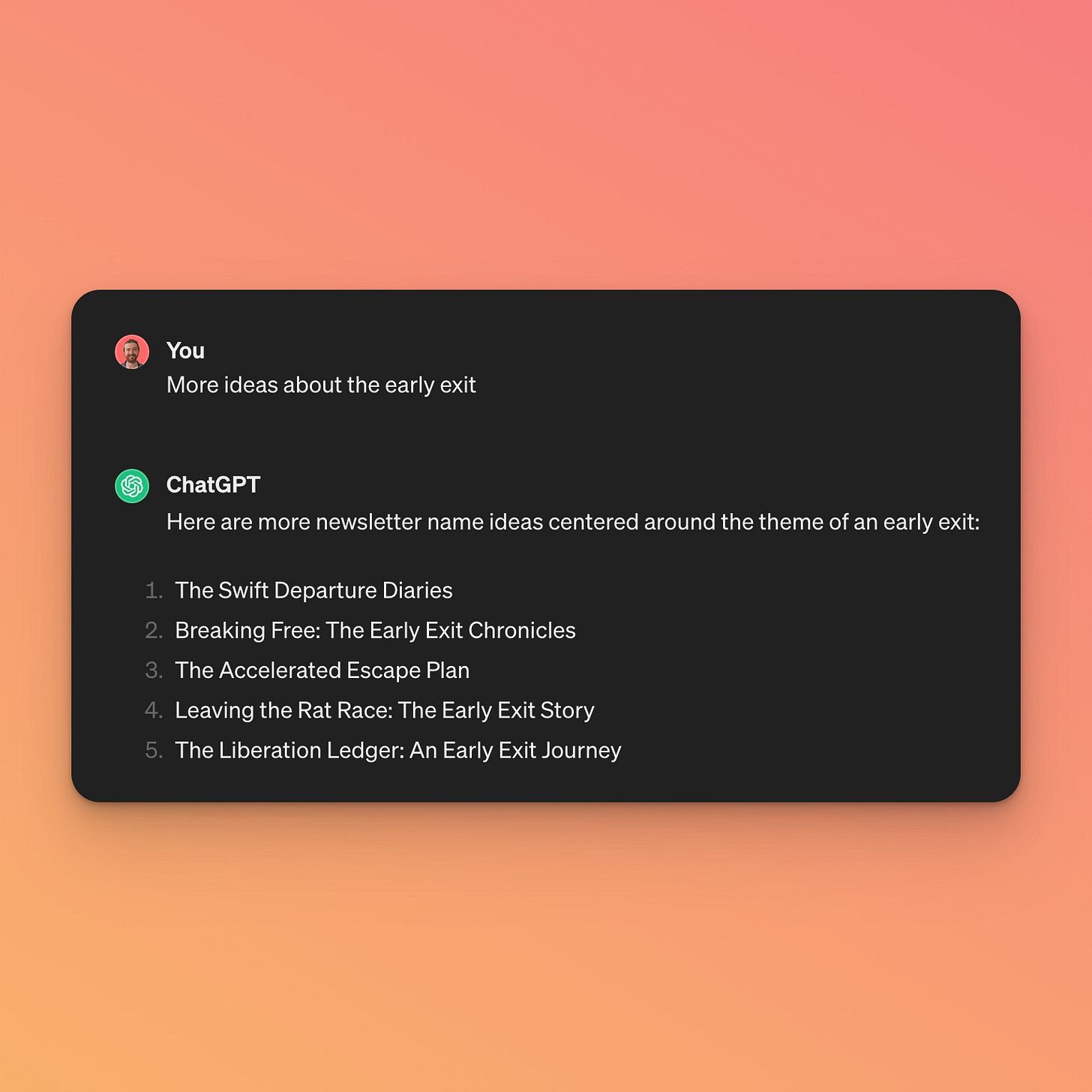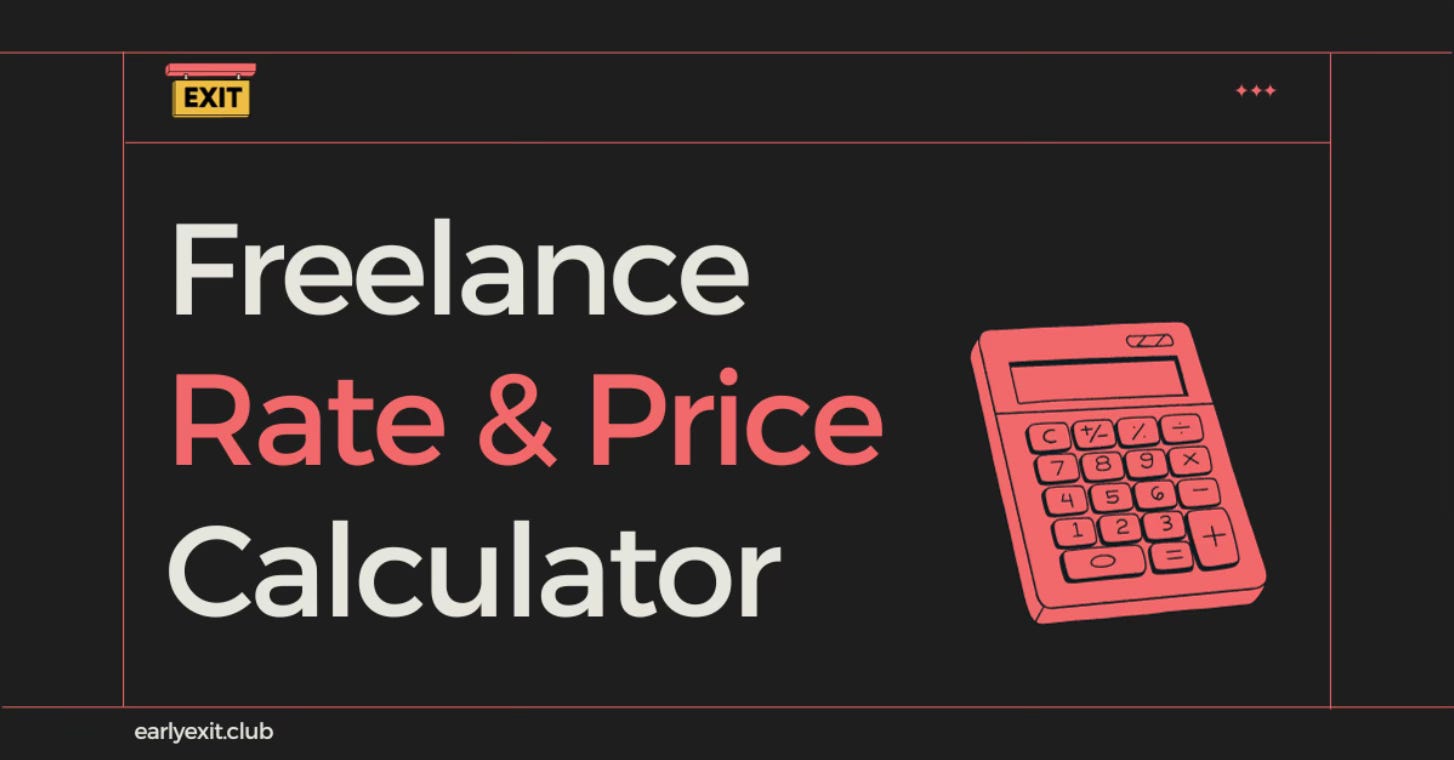Everyday Empires: Meet Nick Lafferty of Early Exit Club
Discover how Nick transitioned from his 9-5 to a thriving $30K/month solo business, while sharing every step of his journey transparently
Hey folks,
Welcome back to Everyday Empires, your weekly interview series spotlighting everyday founders.
This week, I’m featuring Nick Lafferty of The Early Exit Club.
Nick left his 9-5 in May of 2023 and has been documenting his process as a solopreneur building up his income to $30k/mo on his newsletter, The Early Exit Club. As a solopreneur, he does a variety of activities to generate income, including consulting, writing, and building an online community.
His newsletter is a must-read if you’ve ever thought about leaving your job to pursue self-employment. I binged it recently after I came across it, and my mind has been buzzing with ideas ever since. Before we even get into the interview, take a second to hop over to Nick’s newsletter and subscribe:
I chatted with Nick about his state of mind when he left his 9-5, where his income comes from, why he doesn’t charge hourly and what he does instead, how he used ChatGPT to come up with his newsletter, and his upcoming move from Austin to NYC.
My big takeaways:
He spent 10 years building up his skills and network before leaving his 9-5
Don’t charge hourly. Charge a flat monthly retainer or project fee instead
Sell your time to generate income in the short-term while you build scalable, progressively less hands-on revenue streams for the long-term
If content is part of your business plan, don’t sleep on LinkedIn
Don’t overthink the logistics of getting started (incorporating, finding a CPA, etc.). Just get going and figure that stuff out later
Hey Nick, thanks for being on Everyday Empires! To kick us off, I’d like to take us back to last May. You’re about to leave your 9-5 to freelance and build a $20k/mo solo business. What’s going through your mind? Why are you doing it? What’s giving you the confidence that you’ll be ok? Are you second guessing yourself?
Nick: I’m absolutely second guessing myself in the moments immediately after I put in my 2 weeks. I hung up with my boss and the first words out of my mouth were “what the fuck did I just do?”
I quit a very good, very stable job with a great boss and great co-founders at a startup with tons of promise. I had nothing lined up but a dream and purposely didn’t have a plan B.
But I did have some things that gave me confidence
A very solid emergency fund that could last me 6+ months with $0 income
About $2k/month of advising income
About $2k/month of affiliate income
So I wasn’t going back to $0/month in income which I feel like is extremely important. Because even though I had a good plan A, sometimes plans don’t work out. Or sometimes your HVAC unit breaks 2 weeks after quitting your job and you need to spend thousands of dollars to fix it, which is exactly what happened to me.
But despite all of the worries, anxieties, and second guessing, I still knew it was the right path for me. I had spent 10 years building up my skills and my network, and it was time to cash in.
I wanted to spend my working time doing more of the things that brought me joy and minimize all the stuff that didn’t. For me, that means fewer meetings, fewer slideshows and quarterly reviews, and no people management.
Now I’m able to structure my days and weeks exactly like I want them. I try to take every Friday off to spend time with my wife and dog. I schedule all client meetings in the afternoon. I frequently decline prospective clients that aren’t a good fit for me.
You’ve written about not charging hourly for consulting work so that you don’t penalize your own efficiency. Can you share with us how you do charge, and how you communicate your fee structure to potential clients?
Charging by the hour is the best way to hamstring your income as a consultant. I charge a flat monthly retainer for my services, but you can also charge on a per project basis as well.
Here’s how that breaks down. I have two packages that I offer clients:
Growth Marketing Advising: 2-4 hours/month of mostly calls and very little hands-on work for me. This is me telling you how to do the thing (and often, what things not to do at your current growth stage) but not actually doing it for you.
Operational Performance Marketing: Full service management of Google Ads and LinkedIn ads to hit your growth targets. This is me actively doing the thing for you.
Both of those packages are wrapped into a flat monthly retainer. My rates for new clients right now are:
Advising: $4k/month
Operational: $8k/month
I arrived at these numbers by first massively undercharging myself when I first started out. After signing a new client I’d always raise my rates for the next client, typically in $500 or $1,000 increments. I also spoke with a lot of other consultants to ask how much they charge. Most consultants are more than happy to chat with you if you ask nicely.
I don’t negotiate my rates, but I do accept equity in the business in exchange for lowering my cash rate. Typically I ask for 2x the value in equity (e.g. if I lower my advising cash rate to $2k/month, I ask for $4k in equity) because taking equity is inherently risky.
How successful you are at doing this comes down to how well you define your personal positioning. If you are known as one of the top 1% people in your space then you can, and should, charge appropriately for it.
Your solo business consists of a mix of near-term and longer-term strategies. Can you give us a brief overview of these different income streams and the ultimate vision you’re working toward?
My ultimate vision is to stop trading my time for dollars and build up a mostly-passive source of income. Right now all of my income comes from trading my time for dollars so I’m quite far from that ultimate goal. I hope to get there within the next 5 years by the time I turn 40.
My income streams are broken up into:
Short term: Consulting income. This is the most immediate exchange of my time for money.
Medium term: Affiliate and digital product income. This takes a bit longer to get going but becomes more passive overtime once you’ve built a library of products and have consistent eyeballs looking at them.
Longer term: A paid community for current and aspiring marketing freelancers to ask questions, get feedback, and network. I hope to launch the first version this year and it’s powered by my newsletter and social media content, both of which are a heavy priority for me.
When I quit my job I focused most on short term income. Now that it’s dialed in, I’m trying to carve out time to work on my longer term projects. It’s quite difficult for me to do that because the short term money is so good and I’ve filled up all available working time with that. Over the coming year I will continue raising my rates so I can take fewer clients while making similar income. Then I’ll use the additional time to work on my longer term projects, or at least that’s the plan 😀
Ever since discovering your newsletter, Early Exit Club, I’ve devoured a bunch of your old posts. It’s so good! I’m curious: how did it come about? And do you see it as part of your long-term revenue strategy?
It’s absolutely part of my long-term revenue strategy. But here’s my secret: I love writing it. The entire process of going from idea to fully flushed out post brings me so much joy and happiness. Then after I push send, seeing all the positive responses come into my inbox gives me all the motivation I need to keep going.
The funny thing is The Early Exit Club wasn’t initially part of my exit plan when quitting my job. My long term plan was to learn to code and build a SaaS app idea I had. But I soon realized that it was naive of me to think I could do that successfully in a relatively short amount of time, so I pivoted into something I could immediately work on, which was writing.
I had the idea at the gym one day and spent some time with ChatGPT to brainstorm ideas for a newsletter about transparently sharing your income as you worked towards a major goal. While ChatGPT didn’t ultimately come up with the name Early Exit Club, it gave me the words ‘early exit’. Here’s part of the transcript:
A quick domain search for ‘earlyexit.club’ and $10 later I was off to the races.
Editor’s note: funnily enough, I had a similar conversation with ChatGPT when I was dreaming up what would become Everyday Empires.
LinkedIn seems to play a pivotal role in your business, from helping folks discover your newsletter, to acquiring new clients. You even hired a LinkedIn writing coach. Have you had any “aha” moments or things you’ve learned that have had a big impact on your engagement there?
The best advice I can give is to write the thing that makes you the most nervous. After my last company Loom was acquired by Atlassian for $1b, I had the idea of showing exactly how much money I made as a way to unpack how equity in startups work.
The idea of doing that made me insanely nervous, but it’s now my most successful LinkedIn post and newsletter.
People crave authentic, interesting, and vulnerable stories on social media. Gone are the days of showing your highlight reels: give us the real shit instead.
I advise all of my clients to build LinkedIn into their growth strategy because it’s such a valuable place to build an audience by sharing your thoughts and opinions. All of my newsletter subscribers come from LinkedIn, either posting myself or commenting. It’s the best feedback loop I’ve ever had as a professional marketer: I post -> I get more subscribers.
From stay-at-home parents with a side hustle to folks freelancing full-time, everyone’s availability and life situation is different. To give folks a frame of reference, can you share a glimpse into your day-to-day life?
My wife and I both work from home and run our own online businesses. We wake up in the morning and immediately take our 15 year old dog Vito out for a walk around 7:30am. By 8am we’re having coffee and breakfast, and by 8:30 I’m starting my work day by checking emails, Slack, and the performance of my client’s ads.
After checking in, I review my to-do list from the day before and prioritize the bigger work that needs doing. Sometimes it’s building out new campaigns, troubleshooting why some campaigns aren’t performing, or creating documentation.
Vito gets another walk at 10:30am, this one shorter than his morning one. After some more work or the occasional meeting, we have lunch around 11:30 or 12.
My afternoon is usually filled with client meetings or networking calls. On really really good days, Vito gets another walk in the hiking trails by our house around 1pm, but this is dependent on me not having a lot of meetings that day and the weather being good.
By 4pm I’m ready to finish for the day so I’ll write out my to-do list for tomorrow. I’ve found that I need separation between ending my work day and beginning my personal time, so I try to exercise every day by lifting weights. I workout at my city’s local activity center which is lower cost and filled with really sweet retired people, some of them are my neighbors who I often talk with. I’m usually back from the gym and having dinner around 5:30, then we settle in for some TV (currently watching True Detective Season 4).
I will do additional work after dinner if I need to, but it’s rare. I watch a lot of basketball (Go Mavs!) so that’s usually what’s on in the evenings as we unwind.
I also rarely write my newsletter during the work week. It’s usually a Saturday/Sunday thing for me because I need space to think creatively about myself and my work, which is hard to do during the week when my cycles are spent on my clients instead.
Professionally, is there anything keeping you up at night? Any big hurdles or major concerns? Any part of your business you wish you didn’t have to do?
Right now I’m planning a big move from Austin to NYC which means downsizing our stuff. We’ve accumulated so many things while owning a home and very few of them will fit in a tiny NYC apartment. I love the process of removing clutter from my life so I find this very energizing.
Renting a place in NYC means proving you make 40x the monthly rent in annual income, so I was very focused on exceeding that number in our target neighborhood and budget as well.
This is the biggest move of our lives but we could not be more excited. Our best friend lives in Brooklyn and we’re focused on spending more quality time with the people that matter most to us. I also can’t wait to sell my car and move to a walkable area.
I’ve noticed a lot of new entrepreneurs get caught up on the admin side of their business (incorporating, accounting, taxes, banking, health insurance, etc). Do you use any tools or services to handle that stuff? Did you have it all in place when you quit your 9-5 or did you figure it out later?
I had a good handle on taxes because I’d been freelancing while holding down my 9-5 for a few years and I sadistically loved doing my own taxes and researching personal finances. I’m a big advocate of Solo 401ks and saving for retirement.
I use an invoice tool called Wave because they don’t charge a monthly fee. I also use Bonsai to easily create new contracts because they have great templates that make you look really professional, but I usually cancel my subscription when I’m not actively in late stage conversations with clients.
That’s all the planning and admin work I did for my business until very recently. As long as you can easily create contracts and send invoices, that’s all you need to get started. I didn’t have an LLC until very recently when I found a CPA to do my taxes.
Health insurance is the most important thing to nail down before quitting your job. Because we’re both self-employed, my wife and I purchase our insurance through Healthcare.gov and we pay a total of $740/month for probably the worst insurance I’ve ever had. We’re both young-ish and healthy and have a good emergency fund, but I miss the company-sponsored insurance I used to get for very cheap.
Someone reading this wants to quit their 9-5 and build a solo business of their own. What’s the best piece of advice you can give them? Any must-read books or other resources come to mind?
Read my newsletter 😅. But seriously, find people you know who are 1-2 years ahead of you and pepper them with questions. Everyone’s story is different and we’ll all have different advice to give, but it’s so helpful to know other people who went through the same thing as you’re about to.
You should also lean on your network to find your first clients. Reach out to former bosses, colleagues, and VPs who know your skills. Ask if they know anyone who needs help. Set your rates at a price that makes you nervous using my free rate calculator.
Before we wrap, is there anything about your journey we haven’t covered that you’d like people to know?
No, you asked great questions. Thank you for giving me the opportunity to tell my story!
Lastly, where should readers follow you?
Follow me on LinkedIn and subscribe to my newsletter!
That’s a wrap
A massive thank you to Nick for sharing his time with us!
If you enjoyed this, you can support Everyday Empires by taking a moment to:
❤️ Like this post to get it in front of more future founders
💬 Reply or comment and share your thoughts or ask a follow up question
📤 Forward this post to someone who’d benefit from it
See y’all next week,
Ken
P.S. Follow me on X or LinkedIn for more insights from the founders I chat with






